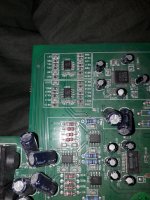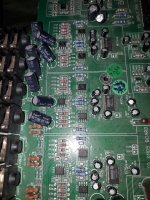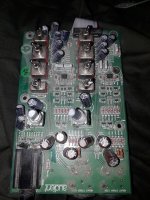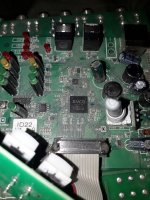You are right, OPA1656 is interesting part, but as anything in engineering field it depends on user case and circuit environment. Any way, it is also interesting alternative although it is CMOS based design for buffer role. As preamp its 40-4.5nV in 10-1000Hz range, can be influential (heard) on the large gains. For example Ti do not specified Av (gain) for measuring: input voltage noise f = 20 Hz to 20 kHz ~0.53 μVRMS. is it 10, 20, or 100?. And all of those excellent harmonic distortion values are represented on ideal G=+1 and will deteriorate. But when you put them with other Op.Amps in the same +40 or +50dB PreAmp setup and input (for ~560Ohm/450uH phono-head) for comparison, all those stellar performance deteriorate almost bay applied amplification fold. So I it is essential to read small letters in all of those data sheets or you will end up disappointed with expensively paid IC-s that can not perform well on your desired case.The thread was started in 2014. In 2022 one would suggest OPA1642 and OPA1656 methinks.
Very nice presentation in the link! Thank you.
That sad OPA1642 is not the same league as OPA2228 which is for its par just a one bit better then NJM2068MD at +40dB, and that you can not see in the technical spec.
Interesting I could systematize and publish some paper about those findings, although it will not be recognized as significant scientific work for my academic resume 🙂
Best regards,
dr Jovan Ivković
I can give one subject opinion that the best sounding OpaAmps for +3..+10x was AD8056 and AD8045.Why? We are all humans, no one has a patent on the truth. Did you see a billionaire making a joke with a sink last Thursday?
I know that they are high speed Video OpAms that I tried in the setup just for comparative with others and that they have HUGE distortion. Bat boy-o-boy they sound so GOOOD on all of my studio speakers and headphones (starting with old Yamaha RH-5Ma up to Pioneer DJ Headphone HRM-5 and HRM-6).
Thy preserve sub and ultra sonic range and recreate all of those hi-order harmonics that is needed to have to be able to represent even square or triangle wave shape on 10-15kHz (and just for the record even in my age I can spot range from 15Hz to 18,4KHz with grate accuracy).
The are dynamic, open, full of details and crystal crisp in whole range, but are definitely best sounding op-amp for anything under 200Hz, so be ready to cray when you hear Alpa or other waves in 25-40Hz range.
Unfortunately I can not post you 657MB mono WAV of the whole recording of "Madis - Sea of Tranquility (Full Album 2020)" album, proceed thou 10x gain AD8055 but I will cut one important beet illustrate that dynamics.
They sound good but are they for High fidelity audio representation of sound, answer is NO, Objectivity they introduces there flows as sound picture in the output signal.
Just to add that AD8099 was the biggest disappointment (after much hyped LM4562NA/49720 for high gain design) and on the other side NJM2043DD and 2068DD was biggest surprises.
You can compare it to the rest of the original at:
Attachments
Can't tell much with that type of music. How about some high res classical piano (or at least CD quality)? That's harder to reproduce well. Do you need a test file?
Njm2043dd was used as recording amp in all best Nakamamichi tape decks.For that matter I bought about 25 the first time I saw them available at Mouser in 2017 , BUT their output voltage offset was huge, the input impedance also low and their input bias current high so current noise is not great ... They are perfect when driven from a very low impedance source, prefferably below 100 ohm.
The true value for the money with mid impedance inputs that you'll see populating some Fostex recording consoles was NJM2041... almost the same overal noise , lower slew rate 3v/us as 4559dd thus more stable. Actually njm4559 was used also in Fostex 8A 38ips reel to reel...and it's a pretty good sounding IC, same league with m5218.
NJM2068 are really quiet .NAD, Tascam, Fostex used them.
I don't trust Groner's analysses, measurements and claims. At all!
OPA2132 and OPA2228 are really good sounding op-amps.OPA2132 is not identical to OPA2134 " except offset" as Groner claimed.They do sound differently on different type of loads and i'm not a golden ear.
I can't trust a guy claiming unmeasurable -180db thd for his " famous" op amp. Besides a very simple simulation shows his invention very unstable .
If you look in semiprofessional to professional consoles of the 90's that were liked by many musicians you'll see the highest distortions op amps by Groners and the likes by the zilions.
By the way, now that this old topic was resurected, I'm going to tell once again that LM833 has a very good sound when used in I/V circuits and because I tried it against most audio op-amps I'll say one thing that's very noticeable to any untrained ear: In the same identical i/v circuit so with the same feedback applied and identical dac, after tda 1541or 1543 , lm833 sounds literrally louder than any other bipolar op-amp I tried. At least 3 db louder. If you have a good explanation I'm waiting for it.
And don't you dare to forget upc4570 cause that's a hell of an op amp that very few people talk about.
Njm8087 and njm8080 are today's good deals.
The true value for the money with mid impedance inputs that you'll see populating some Fostex recording consoles was NJM2041... almost the same overal noise , lower slew rate 3v/us as 4559dd thus more stable. Actually njm4559 was used also in Fostex 8A 38ips reel to reel...and it's a pretty good sounding IC, same league with m5218.
NJM2068 are really quiet .NAD, Tascam, Fostex used them.
I don't trust Groner's analysses, measurements and claims. At all!
OPA2132 and OPA2228 are really good sounding op-amps.OPA2132 is not identical to OPA2134 " except offset" as Groner claimed.They do sound differently on different type of loads and i'm not a golden ear.
I can't trust a guy claiming unmeasurable -180db thd for his " famous" op amp. Besides a very simple simulation shows his invention very unstable .
If you look in semiprofessional to professional consoles of the 90's that were liked by many musicians you'll see the highest distortions op amps by Groners and the likes by the zilions.
By the way, now that this old topic was resurected, I'm going to tell once again that LM833 has a very good sound when used in I/V circuits and because I tried it against most audio op-amps I'll say one thing that's very noticeable to any untrained ear: In the same identical i/v circuit so with the same feedback applied and identical dac, after tda 1541or 1543 , lm833 sounds literrally louder than any other bipolar op-amp I tried. At least 3 db louder. If you have a good explanation I'm waiting for it.
And don't you dare to forget upc4570 cause that's a hell of an op amp that very few people talk about.
Njm8087 and njm8080 are today's good deals.
Last edited:
Mmm
First thing I used to do when I saw upc4570 or M5218 was to replace them. They are nothing special, on the contrary. You are right about OPA2132 and OPA2134. They sound clearly different.
I trust Groner over musicians opinions. If we would see their or mixing console manufacturers choices/opinions as leading everything would have NJM4580 🙂
Thankfully we are decades further in time and excellent opamps can be chosen today (if you can obtain them that is).
Good stuff!BUT their output voltage offset was huge, the input impedance also low and their input bias current high so current noise is not great ... They are perfect when driven from a very low impedance source, preferably below 100 Ohm.
First thing I used to do when I saw upc4570 or M5218 was to replace them. They are nothing special, on the contrary. You are right about OPA2132 and OPA2134. They sound clearly different.
I trust Groner over musicians opinions. If we would see their or mixing console manufacturers choices/opinions as leading everything would have NJM4580 🙂
Thankfully we are decades further in time and excellent opamps can be chosen today (if you can obtain them that is).
Last edited:
You probably never tried upc4570 or m5218 on 200...600 ohms headphones .
A friend of mine just came a week ago from the USA with some Hifiman Sundara and a cheap portable FIIO clas d hph amp plus dac and he and I couldn't hear a significant difference when driving his headphones with inverted opa2228, my germanium trz Chapter one hph amp and his fiio box but I used my 250 ohms bayerdynamic on the same amps to hear a difference and his lower impedance Sundara had better highs and mids just lower content of base sounding more natural than my bayerdynamics. Sundara's low impedance didn't affect opa2228 !
In early 2017 I had an intuition and I bought Audient ID 22.It used all good cheap technologies that are good enough.in 2018 it was no 1 soundcard for recording sold on Amazon.5 years later Audient has the best quality/price ratio with similar products and technologies.Not going into the crazy youtube reviews..
Since I got this soundcard it stays open on a table. I only bought it to study it as I'm not a music producer.
Check out its ne5534 mike preamp, its all NJM8080 analog signal chain, xmos based asyncronous usb ...When I bought it I thought I could improve it with lm4562, ada 4898-2, opa2132...which I had in abundance.
AFTER 5 years I'm glad I never touched it. Anyway this soundcard needs better regulators not op amps...Just checking the capacitor shelf life for now 😉
If musicians or music maker's opinions don't count, our opinions don't count either!
https://www.homemusicmaker.com/best-sound-cards-for-music-production1
Do you know why in 2022 I bought Tripath's ta2024? Because I believed the critics that a decade ago were praising Topping TP31 hph amp!
A friend of mine just came a week ago from the USA with some Hifiman Sundara and a cheap portable FIIO clas d hph amp plus dac and he and I couldn't hear a significant difference when driving his headphones with inverted opa2228, my germanium trz Chapter one hph amp and his fiio box but I used my 250 ohms bayerdynamic on the same amps to hear a difference and his lower impedance Sundara had better highs and mids just lower content of base sounding more natural than my bayerdynamics. Sundara's low impedance didn't affect opa2228 !
In early 2017 I had an intuition and I bought Audient ID 22.It used all good cheap technologies that are good enough.in 2018 it was no 1 soundcard for recording sold on Amazon.5 years later Audient has the best quality/price ratio with similar products and technologies.Not going into the crazy youtube reviews..
Since I got this soundcard it stays open on a table. I only bought it to study it as I'm not a music producer.
Check out its ne5534 mike preamp, its all NJM8080 analog signal chain, xmos based asyncronous usb ...When I bought it I thought I could improve it with lm4562, ada 4898-2, opa2132...which I had in abundance.
AFTER 5 years I'm glad I never touched it. Anyway this soundcard needs better regulators not op amps...Just checking the capacitor shelf life for now 😉
If musicians or music maker's opinions don't count, our opinions don't count either!
https://www.homemusicmaker.com/best-sound-cards-for-music-production1
Do you know why in 2022 I bought Tripath's ta2024? Because I believed the critics that a decade ago were praising Topping TP31 hph amp!
Attachments
Never use headphones, headphone amplifiers, battery fed portable stuff or sound cards. Zero, nada, niemals.
Only good old 230V AC fed stuff via speakers. My opamp experiences were maybe therefor different.
NJM4580 is not chosen for its stellar performance, it is chosen because it performs good for its incredibly low price. When musicians that are a bit tech minded see them in every device well then….
Only good old 230V AC fed stuff via speakers. My opamp experiences were maybe therefor different.
NJM4580 is not chosen for its stellar performance, it is chosen because it performs good for its incredibly low price. When musicians that are a bit tech minded see them in every device well then….
I have 3 Lenovo-IBM laptops that failed me one after another on computing or hdd headroom , but they never failed me on headphones headroom with their tiny class d chips .
I think I have a Marantz cd 5000 cd player with njm4560...It played well...some say its tda1549 was the best Philips DAC, but there's a njm4560 after that...so you needed to listen that op amp too to evaluate the DAC...That's conflicting 🙂.
Well my other phylips and marantz cd players are using lm833 and njm2114 as i/v converters and I'm totally fine with them.All the best Denons of the 90's used upc4570 as I/V and ne5532 after them and that tells something!
Well my other phylips and marantz cd players are using lm833 and njm2114 as i/v converters and I'm totally fine with them.All the best Denons of the 90's used upc4570 as I/V and ne5532 after them and that tells something!
Attachments
https://nwavguy.blogspot.com/2011/08/op-amps-myths-facts.html
https://nwavguy.blogspot.com/2011/08/op-amp-measurements.html
Good read, from the maker of O2 headphone amp
https://nwavguy.blogspot.com/2011/08/op-amp-measurements.html
Good read, from the maker of O2 headphone amp
Last edited:
My Audient ID22 in 2022 has the exact same price I paid in january 2017 so those njm8080 must be doing fine...Do you know many soundcards keeping their price unchanged for 6 years ?All very old stuff ... time goes the other direction.
https://www.thomann.de/ro/audient_i...MI47P2gcKI-wIVkxWLCh2tIAw8EAQYASABEgJnwfD_BwE
...I even change the Vcc and Vee rails voltages, to be able to accommodate my all-time favourite AD8066 / AD8065. Stunning. But, this is only If I have to modify something that comes with very old OPAmps. These days the likes of OPA1642 / OPA1612 are routinely used, so I leave those alone.
I personally decided a few years back, that it was time for me to get rid of all ICs and sound coupling caps in my signal chain.
I personally decided a few years back, that it was time for me to get rid of all ICs and sound coupling caps in my signal chain.
Just finished a remarkable RIAA preamp for AT VM95ML using NJM2068. It's an outstanding chip that is stable and fast and very low noise.
It's a gem
It's a gem
- Home
- Source & Line
- Digital Source
- Replacing NJM2068 and NJM4580 by AD8620 or LM4562




